Baker Academic Theological Studies Collection (18 vols.)
Digital Logos Edition
Overview
The Baker Academic Theological Studies Collection contains 18 volumes of contemporary scholarship from today’s top thinkers, including Craig L. Blomberg, Veli-Matti Kärkkäinen, Bruce L. McCormack, John G. Stackhouse Jr., and others. This collection covers wide-ranging topics, among them premillennial eschatology, Christology, pneumatology, ecclesiology, theological anthropology, modern theology, atonement theology, evangelical theology, and Trinitarianism.
Discover systematic theology’s influential figures, important doctrines, and modern critiques. The collection analyzes justification doctrine and the doctrine of God, provides various approaches to studying New Testament Christology, illustrates the overlap between art and spirituality, examines the state of the evangelical church in mission and doctrine, provides a contemporary understanding of justification and atonement doctrines, and follows Trinitarianism’s development. Three volumes provide ecumenical, international, and contextual introductions to Christology, the doctrine of God, and pneumatology—providing biblical, historical, and contemporary assessments.
Don’t forget the Baker Academic Theological Studies Upgrade.

- Encourages application of key theological principles to everyday life
- Provides contemporary, biblical perspectives from today’s top scholars and theologians
- Discusses the doctrines of creation, justification, and union with Christ
- A Case for Historic Premillennialism: An Alternative “Left Behind” Eschatology edited by Craig L. Blomberg and Sung Wook Chung
- Christology: A Global Introduction: An Ecumenical, International, and Contextual Perspective by Veli-Matti Kärkkäinen
- Creator Spirit: The Holy Spirit and the Art of Becoming Human by Steven R. Guthrie
- The Doctrine of God: A Global Introduction: A Biblical, Historical, and Contemporary Survey by Veli-Matti Kärkkäinen
- Engaging the Doctrine of God: Contemporary Protestant Perspectives edited by Bruce L. McCormack
- Evangelical Ecclesiology: Reality or Illusion? by John G. Stackhouse Jr.
- Exploring Ecclesiology: An Evangelical and Ecumenical Introduction by Brad Harper and Paul Louis Metzger
- God so Loved the World: A Christology for Disciples by Jonathan R. Wilson
- God the Holy Trinity: Reflections on Christian Faith and Practice edited by Timothy George
- God’s Good World: Reclaiming the Doctrine of Creation by Jonathan R. Wilson
- God’s Many Splendored Image: Theological Anthropology for Christian Formation by Nonna Verna Harrison
- Justification and the Gospel: Understanding the Contexts and Controversies by R. Michael Allen
- Justification in Perspective: Historical Developments and Contemporary Challenges edited by Bruce L. McCormack
- Mapping Modern Theology: A Thematic and Historical Introduction edited by Kelly M. Kapic and Bruce L. McCormack
- Pneumatology: The Holy Spirit in Ecumenical, International, and Contextual Perspective by Veli-Matti Kärkkäinen
- Retrieving Nicaea: The Development and Meaning of Trinitarian Doctrine by Khaled Anatolios
- Union with Christ: Reframing Theology and Ministry for the Church by J. Todd Billings
- Violence, Hospitality, and the Cross: Reappropriating the Atonement Tradition by Hans Boersma
This title is included in the following collections
You can save when you purchase this product as part of a collection.
Baker Ultimate Collection 2022...
$38,273.89$30,599.99
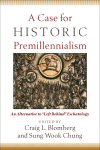
Twentieth and twenty-first-century American evangelicalism, particularly at the popular level, has been virtually saturated with the eschatology of dispensational premillennialism. The distinctive teachings of that system, in particular its affirmation of the pretribulation rapture of the church, have become so pervasive that many evangelicals would be hard pressed to identify an alternative approach. Popular novels that disseminate dispensationalism to a wider readership have only furthered that trend.
The contributors to this volume provide a thoughtful alternative. They present compelling arguments for historic or classic premillennialism—a position widely held throughout church history (and popularly advanced in the writings of George Eldon Ladd). An introductory chapter examines the differences within premillennial eschatology and considers reasons for the widespread popularity of dispensationalism in the twentieth century. This is followed by biblical, theological, historical, and missiological studies that reexamine classic premillennialism, particularly with regard to its understanding of the return of Christ.
The authors, all respected scholars in their fields, present arguments for a return to an eschatological theology that was widely held for many centuries. Their engaging studies should be of great interest to evangelical readers—both in the academy and in the church.
Contributors:
- Craig L. Blomberg
- Oscar A. Campos
- Sung Wook Chung
- Helene Dallaire
- Donald Fairbairn
- Richard S. Hess
- Don J. Payne
- Timothy P. Weber
It’s about time we had a scholarly presentation and defense of historic premillennialism, which is probably the majority view of the ‘end times’ among theologically trained evangelicals. These authors are eminently qualified to give us that, and here they have done it. All evangelicals and others interested in alternatives to the popular folk religious beliefs about the ‘end times’ must read this book. If read carefully by many, it will turn the growing tide of ‘pretrib rapturism’ and restore the eschatology of the Bible and the church fathers.
—Roger E. Olson, professor of theology, George W. Truett Theological Seminary, Baylor University
This book provides a welcome alternative to popular notions of the end-times, which sometimes seem to be recycled news headlines. Particularly helpful is the book’s critique of ‘left-behind’ theology, which I believe can be defended only by taking a lot of Scripture out of context.
—Craig S. Keener, professor of New Testament, Asbury Theological Seminary
A welcome conversation piece in eschatological studies. . . . It is recommended for students, pastors, and scholars.
—Theological Book Review
[This] volume represents a more formal and sustained presentation of historic premillennialism than has been offered since the work of the late George Eldon Ladd. . . . A Case for Historic Premillennialism is a valuable contribution to millennial discussions.
—Trinity Journal
Blomberg and Chung offer a generally readable and interesting collection of essays arguing for the relative merits of the historic version [of premillennialism], as well as for the merits of premillennialism in general. . . . This edited volume covers most of the topics in good introductory fashion.
—Christian Reflection
The authors of these essays are excellent scholars and their arguments in support of their views are presented well. They defend a legitimate Christian eschatological position and they do so competently. . . . This book is a helpful explanation and defense of posttribulational premillennialism. It is a good introduction to the biblical and historical support for that position and serves as a good place to start for those who desire to understand it better.
—Bibliotheca Sacra
Craig L. Blomberg is a distinguished professor of New Testament at Denver Seminary. He is the author or editor of 13 books, including Introduction to Biblical Interpretation, Jesus and the Gospels, and Making Sense of the New Testament.
Sung Wook Chung is an associate professor of Christian theology and the director of Korean Initiatives at Denver Seminary. He is the author of Karl Barth and Evangelical Theology and editor of Christ the One and Only: A Global Affirmation of the Uniqueness of Jesus Christ.
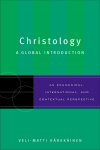
Christology provides an ecumenical, international, and contextual introduction to the person of Christ in contemporary theology, both in the Western academy and in two-thirds world theologies. It offers three main perspectives on Christology (biblical, historical, and contemporary) and combines classical and contextual work done in Christology over the course of church history.
Veli-Matti Kärkkäinen begins with a survey of the various approaches to studying New Testament Christology on the basis of contemporary biblical studies. He compares and contrasts the Gospels’ testimonies to Christ as well as the outline of Pauline Christology.
Next, Kärkkäinen explores Christology from a historical perspective. He outlines the early Christological debates, including those at Nicea (325) and Chalcedon (451), and describes their relevance to later history and contemporary theology. Kärkkäinen then describes the search for the historical Jesus and its relevance to Christology, as well as the reasons for its ultimate failure.
An extended discussion of 10 major Western Christologies forms the next section and provides the primary focus of the book. Included is an introduction to the work of ecumenically and theologically representative theologians, such as Karl Barth, Jurgen Moltmann, Wolfhart Pannenberg, and Karl Rahner, as well as Norman Kraus, Stanley Grenz, and John Hick.
Finally, Christology delves into contextualized interpretations of Christ in various parts of the world. North American, feminist, process, black, and postmodern Christologies are discussed and evaluated. Asian (“Christ as universal Savior”), African (“Christ as Ancestor”), and Latin American (“Christ as Liberator”) Christologies round out the discussion.
Christology should fit textbook needs in a variety of traditional and contemporary theology classes. The book will be a natural complement to a standard doctrine of Christ textbook in that it provides in one place materials that normally can be found only in several scattered sources. Additionally, it offers valuable insight for scholars, pastors, and readers interested in contemporary Christology.
Christology is profound and insightful in taking issue with various approaches and understandings of Jesus Christ. It is an original and creative masterpiece that introduces Christological issues with intellectual clarity and theological quality. After reading this work, I have no hesitation in recommending it to all students at seminaries and anyone interested in Christianity and theology.
—Paul Chung, associate professor of mission and world Christianity, Luther Seminary
No other book so comprehensively and helpfully surveys contemporary options in Christian thinking about Christ, including Christologies arising out of the two-thirds world. It is a reliable guide to cutting-edge reflection on the history, development, and contemporary contextualization of the doctrine of Jesus Christ.
—Roger E. Olson, professor of theology, George W. Truett Theological Seminary, Baylor University
Veli-Matti Kärkkäinen’s Christology is breathtaking in scope and pace. This introduction is unique in breadth and clarity. Every reader can learn from it.
—Colin Brown, senior professor of systematic theology, Fuller Theological Seminary
Kärkkäinen shows the vast richness of Christological reflection. . . . The breadth of views is remarkable.
—Living Church
Kärkkäinen does a commendable job of presenting the foundations of the various Christological approaches without offering diatribe against the subjects under discussion. Given the range of theologians . . . this discipline shows Kärkkäinen’s professionalism and contributes to the overall effectiveness of the book as a text for students.
—Review and Expositor
Veli-Matti Kärkkäinen received his DTheol from the University of Helsinki. He is a professor of systematic theology at Fuller Theological Seminary and also holds teaching posts at the University of Helsinki and Iso Kirja College in Finland. He is the author of Pneumatology: The Holy Spirit in Ecumenical, International, and Contextual Perspective.
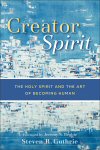
Art is often viewed as being inherently spiritual. But what does it mean to describe an experience of art or beauty as spiritual? Is there a relationship between the spiritual experience a person has in the presence of a work of art and the Holy Spirit of Christian faith?
Theologian, musician, and educator Steven Guthrie examines particular areas of overlap between spirituality, human creativity, and the arts with the goal of sharpening and refining how we speak and think about the Holy Spirit. Through his exploration of the many different connections between art and spirituality, Guthrie uses the arts as a creative lens for exploring the Holy Spirit and offers a unique introduction to pneumatology. He also introduces an important idea from the early church that is now unfamiliar to many Christians: the Holy Spirit is the humanizing Spirit, whose work is to remake our humanity after the image of the perfect humanity of Jesus Christ.
This clear, engaging theology of the arts will be of interest to professors and students in theology and the arts, pneumatology, and systematic theology courses as well as thoughtful lay readers, Christian artists, worship leaders, and pastors.
This book participates in a growing movement interested in the intersection of art, faith, and spirituality. But this book also stands out as a leading voice in this field because of its breadth of vision for the sources and functions of the arts in human life and because of the specificity and clarity of its theological convictions about the work of the Holy Spirit and the expansive nature of salvation offered in and through Jesus Christ. The book’s particular interest in Athanasius is especially welcome, inviting all of us to sharpen and deepen our theological vision and to wrestle with the astonishing implications of the incarnation for human flourishing.
—John D. Witvliet, director, Calvin Institute of Christian Worship, Calvin College and Calvin Theological Seminary
Creator Spirit is a brilliant book! Steven Guthrie makes nuances exceedingly accurately, so that his readers are able to distinguish various ideas in Christianity (such as ‘mortification’ and ‘beauty’) from their mistaken use in historical and postmodern philosophies about the arts. Guthrie consequently frees us to recognize more clearly and biblically the labors of diverse artists and the liberating presence of the Holy Spirit. You will devour this volume, and it will increase your faith!
—Marva J. Dawn, teaching fellow in spiritual theology, Regent College, Vancouver, BC
Creator Spirit brings the Holy Spirit and art together into the creative center of human life. Guthrie shows how the Holy Spirit and art illumine each other and, together, create spaces where God is glorified and we are allowed to become what God intended. This is one of the best treatments of the Holy Spirit’s activity in culture.
—William Dyrness, professor of theology and culture, Fuller Theological Seminary
Guthrie compellingly engages what may be the most profound, yet often the most trivialized, dimension of theological aesthetics. The result is a rich, reflective, and learned work that artists and theologians alike have been hoping for.
—Robin Jensen, Luce Chancellor’s Professor of the History of Christian Art and Worship, Vanderbilt University
Steven R. Guthrie received his PhD from the University of St. Andrews. He teaches religion at Belmont University in Nashville, Tennessee, where he helped launch a new program in religion and the arts. He previously taught at the University of St. Andrews and was on the faculty of the Institute for Theology, Imagination, and the Arts. Guthrie contributed to the Encyclopedia of Christianity, coedited Resonant Witness with Jeremy Begbie, and is the author of numerous articles.
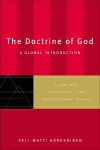
With the closing of the twentieth century, the doctrine of God has once again become a central focus of theological discussion and debate. In The Doctrine of God, Veli-Matti Kärkkäinen provides an ecumenical, international, and contextual introduction to the doctrine of God in contemporary theology. He brings three primary perspectives to the topic (biblical, historical, and contemporary), offers equal treatment to both Western and non-Western theological contributions, and includes discussions of unique contextualized interpretations.
While introducing readers to the relevant biblical and historical developments of the classic theistic tradition, the primary focus of the work is its introduction to major contemporary theological movements and the writings of representative theologians. Kärkkäinen begins with the doctrine of God in the Old and New Testaments, then moves through Patristic and Medieval understandings of God and into the views of Luther and Calvin. He examines the doctrine of God in the thought of Barth, Tillich, Rahner, Kung, Pannenberg, and other European theologians. The heart of the book is an extensive discussion of the doctrine of God in modern movements such as process theology, ecological theology, African and Caribbean theology, Asian theology, and Latin American theology.
This comprehensive textbook will serve courses in the doctrine of God, systematic theology, and contextual theology.
In his fine series of handbooks, Kärkkäinen meets a felt need of many theology students—to be given an introduction in global perspective to great themes like this one: the doctrine of God. The book reveals what theologians around the world are saying about this primary and all-important subject and will stimulate readers to imagine God in more relevant and transforming ways.
—Clark Pinnock (1937–2010), professor emeritus of systematic theology, McMaster Divinity College
This astonishingly wide-ranging and well-informed book will serve as an introduction to the doctrine of God for scholars of all kinds and for many generations of students. The story of the numerous theologians and thinkers within the long, rich, and varied Christian tradition is freshly told with great insight and intelligence. In addition to providing a systematic treatment of the historical development of a Christian doctrine of God, this book addresses those parts of the world that, as the twenty-first century develops, are likely to become crucial to Christian scholarship—Africa, Latin America, and Asia. I warmly recommend this book for its thoroughness, scope, clarity, and fairness.
—William K. Kay, professor of theology, Glyndwr University
I know of no better introduction to the essential elements of the contemporary discussion of the doctrine of God than this. The author surveys the biblical and historical materials, recounts recent European and North American responses to classical theism, and then draws African, Asian, and Latin American theologians into the conversation. An impressive accomplishment, this text is very useful to teachers and scholars alike.
—D. Lyle Dabney, associate professor, Marquette University
[A] fascinating historical and global overview of theology.
—International Bulletin of Missionary Research
Kärkkäinen’s brief end-of-chapter summaries, which note the significance of each period and its primary figures, are particularly helpful in such a textbook. . . . The work is a good descriptive ‘global introduction.’ Kärkkäinen’s snapshots of movements, periods, and theologians would be useful in courses on Trinitarian theology.
—Toronto Journal of Theology
Veli-Matti Kärkkäinen received his DTheol from the University of Helsinki. He is a professor of systematic theology at Fuller Theological Seminary and also holds teaching posts at the University of Helsinki and Iso Kirja College in Finland. He is the author of Christology: A Global Introduction.
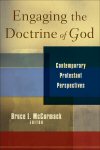
Traditionally, evangelical theology has been committed to a position of classical theism, emphasizing God’s immutability and omniscience. Of late, traditional affirmations have been challenged by theologians who affirm a more Christological focus (often drawing from Karl Barth’s theology) and by those who affirm a theology of “open theism.”
The essays gathered in this collection give evidence of the depth and creativity of contemporary evangelical theology as well as the variety of positions held by those within the movement. Part one focuses on New Testament studies and the earliest development of a Christian doctrine of God. Part two considers two figures who have significantly influenced evangelical theology. Part three examines the cross, the suffering and sovereignty of God, and the contemporary debate, and part four concludes with a chapter on theology and pastoral care.
Both scholars and clergy will find that these essays represent the range of thought within the evangelical tradition. The contributors provide readers with a stimulating guide to the contemporary debate.
Contributors:
- Pierre Berthoud
- Henri A. Blocher
- D.A. Carson
- Oliver D. Crisp
- Paul Helm
- Donald Macleod
- Bruce L. McCormack
- John Webster
- Stephen N. Williams
- David F. Wright
- N.T. Wright
One will find meaty essays here on an important topic: the doctrine of God. The inroads of philosophical secularism in the academy have injured orthodox presentations of God by many Christians. This book can help thoughtful Christians, not because the essays are all equally consistent in upholding orthodoxy, but because they present the parameters of the discussion in engaging ways.
—Logia
A very fine work. . . . McCormack describes Engaging the Doctrine of God as exploratory and a kick-start to a conversation. Indeed it is both. . . . Stimulating and theologically sophisticated material [is] found in this excellent book.
—Themelios
How to understand divine impassibility is a major theme of most of these essays. Some will interest a broader community of scholars working on the doctrine of God and be useful for seminary and graduate courses. Reformed theologians in particular may find the implicit debate between Helm and McCormack concerning Calvin and Barth’s understandings of God thought provoking.
—Religious Studies Review
Preachers will . . . welcome Engaging the Doctrine of God. . . . [It] present[s] fertile ground for serious theological reflection.
—Preaching
Evangelical theologians, ministers, students, and others interested in contemporary Protestant perspectives on the doctrine of God will find this an engaging and insightful book. It provides an excellent introduction to these important issues and makes a helpful contribution to the discussion.
—Bibliotheca Sacra
Bruce L. McCormack received his PhD from Princeton Theological Seminary, his MDiv from Nazarene Theological Seminary, his honorary DrTheol from Friedrich Schiller University. He is the Charles Hodge Professor of Systematic Theology at Princeton Theological Seminary. A world-renowned Barth scholar, he is a frequent writer and lecturer on topics of Reformed theology.
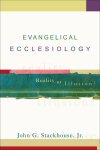
Evangelicals lead churches, plant churches, fill churches, and even split churches. But they have not distinguished themselves in theological reflection on the church. This book tackles what the character of evangelicalism as a loose coalition of Christians says about the movement’s attitude toward the church. Are certain ecclesiologies more in keeping with the evangelical ethos than others? What is the parachurch’s role in shaping evangelical church structure?
Contributors from several disciplines and denominations, including Howard Snyder, George Hunsberger, and Roger E. Olson, examine the state of the evangelical church in Evangelical Ecclesiology. This volume brings together fresh reflections—and provocations—on the subject of the church.
Like most things ‘evangelical,’ evangelical ecclesiology is up for grabs today. Even evangelical theologians, in their attempts to discern what the church is called to be, find themselves looking in a plethora of directions for constructive models, from the free church tradition to Eastern Orthodoxy and the Celtic church. The essays in Evangelical Ecclesiology display not only the tensions within contemporary evangelical thought about the variety of ways in which evangelical thinkers seek to assist the people of God in the task of being the church in the contemporary world but also the vitality of the current discussion.
—Stanley J. Grenz (1950–2005), Pioneer McDonald Professor of Theology, Carey Theological College
I heartily recommend this anthology, not because it will answer any of the questions it poses, but because I put it down with them more sharply focused than before. It belongs on the bookshelves of all, clergy and laity, academic and professional, interested in the continuing development of evangelical identity in North America.
—Canadian Evangelical Review
The book is a welcome introduction into the much-needed discussion concerning evangelical ecclesiology. It is easy to read and has a wealth of footnotes for anyone desiring more in depth study.
—Criswell Theological Review
These essays represent a wide variety of thought-provoking views. One of the strengths of the book is the vigor with which different views are presented and the fact that no attempt is made to reconcile differences or break them down into a common view. . . . This is not a progressively coordinated study like a text with a single author. Its value is perceived to lie in precisely the opposite character—in the diversity of views robustly presented. Several of the chapters could be used to stimulate new patterns of thought in courses on church and mission. The essays in this book make important and serious contributions to thought regarding the evangelical ethos, and its sense of both the church and its mission.
—Missiology
A very interesting book. . . . The book offers valuable insights for theologians and church practitioners. It can be useful to pastors searching for clues to the contemporary maze of ecclesiologies in congregations that choose to leave out the denominational adjective in their names. It will also be useful to students in seminary classes.
—Review and Expositor
John G. Stackhouse Jr. received his MA from Wheaton and his PhD from the University of Chicago. He is the Sangwoo Youtong Chee Professor of Theology and Culture at Regent College, Vancouver. He is the author or editor of 10 books, including Humble Apologetics; Can God Be Trusted?, No Other Gods before Me?, Evangelical Ecclesiology, and Evangelical Landscapes.
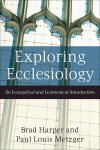
In this introduction to ecclesiology, respected scholars Brad Harper and Paul Louis Metzger offer a solidly evangelical yet ecumenical survey of the church in mission and doctrine. Combining biblical, historical, and cultural analysis, this comprehensive text explores the church as a Trinitarian, eschatological, worshipping, sacramental, serving, ordered, cultural, and missional community. It also offers practical application, addressing contemporary church life issues such as women in ministry, evangelism, social action, consumerism in church growth trends, ecumenism, and the church in postmodern culture. The book will appeal to all who are interested in church doctrine, particularly undergraduates and seminarians.
This is a marvelous volume on ecclesiology in the contemporary setting. Harper and Metzger have produced a text that surveys the broad range of issues related to the church with freshness, theological depth, and genuine insight. Indeed, I have not read a better introduction to ecclesiology and hope that it becomes a standard textbook in college and seminary classes and finds a wide readership outside of the academy. It is a splendid example of theology in service to the church.
—John R. Franke, theologian in residence, First Presbyterian Church, Allentown, PA
This is an important new book. Evangelicals have often emphasized individual faith in Christ at the expense of the corporate character of the Christian community. This book shows why that dichotomy is false by pointing us toward a more holistic ecclesiology—the church biblical, Trinitarian, sacramental, missional, and eschatological. This book needs to be read and heeded!
—Timothy George, dean and professor of divinity, Beeson Divinity School, Samford University
Harper and Metzger provide evangelical Protestants an ideal entree into what has been the long-neglected stepsister of systematic theology in North America. The authors root ecclesiology in the life and missions of the triune God, nourish it with scripture and the rich tradition of the church catholic, and glean abundant fruit by engaging the crucial issues of our time and place. A must read for evangelicals who intuitively know that the church is not incidental or just instrumental to the Christian life.
—Barry Harvey, professor of theology, Baylor University
Harper and Metzger keep their promises with an ecclesiology at once deeply ecumenical and sharply evangelical. They offer a richly Trinitarian and eschatological orientation even as they ground the doctrine of the church in an American context. As a generation of younger evangelicals discover ecclesiology—no, discover the church—I am happy and grateful to be able to refer them to this book.
—Matt Jenson, associate professor, Biola University
Brad Harper is a professor of theology at Multnomah University in Portland, Oregon. He is the college adviser for The Institute for Theology of Culture: New Wine, New Wineskins and the book review editor for Cultural Encounters: A Journal for the Theology of Culture. Harper has also worked as a pastor and church planter.
Paul Louis Metzger is a professor of Christian theology and theology of culture at Multnomah Biblical Seminary and director of its Institute for the Theology of Culture: New Wine, New Wineskins. He is the editor of the journal Cultural Encounters and the author of Consuming Jesus: Beyond Race and Class Divisions in a Consumer Church.
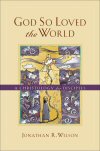
God So Loved the World covers the usual ground of contemporary evangelical and non-evangelical Christologies, but it does so in a unique way. Rather than simply discussing doctrine, Jonathan Wilson has incorporated stories, images, and practices from the New Testament that bring out the relevance of an orthodox Christology for the church and for individual believers. For Wilson, Christology is central to the gospel message.
With both his students and contemporary culture in mind, Wilson has developed a postmodern primer that creatively uses the images of Christ’s work to invite “theological reflection that connects believing with living.” As such, it is a “Christology for disciples,” written in a jargon-free manner that effectively communicates to both an academic audience and thoughtful seekers.
The book’s novel approach and accessible style make it ideal for professors, students, educated laypeople, and spiritual seekers who are looking for an orthodox approach to Christology that also seeks to understand more fully the relevance of Christ in our postmodern world.
‘Love does not judge in order to destroy: love judges in order to redeem.’ With many such quotable sentences, Jonathan Wilson in this book offers to disciples at all levels of maturity an enormous gift—genuine theology for the Church’s life! He deftly sifts and sorts, differentiates and delineates to show us specific liabilities and merits of various ancient and postmodern perceptions of Christ and Christ’s work of atonement. Ideas form us, and Wilson’s form us deeply by clarifying core doctrines of our faith. His Christology is profound enough to grow professionals and accessible enough to guide beginners. Its best outcome will be changed lives—including yours!
—Marva J. Dawn, teaching fellow in spiritual theology, Regent College, Vancouver, BC
A fresh, introductory evangelical Christology which incorporates stories, images and practices of the New Testament to invite ‘theological reflection that connects believing with living.’
—Christian Retailing
Most Christians know more about sports, hobbies, and national politics than about Christian doctrine, observes Wilson, professor of religious studies at Westmont College. Therefore, he introduces theology—and theology about Jesus Christ specifically—for beginners to bridge the gap between theology and the church. . . . This is an interesting and quite original discussion of Christology. It’s an excellent book for evangelical church libraries.
—Church Libraries
Wilson, a professor of religious studies at Westmont College, writes a clear, convicting, and creative postmodern primer on how to live in the present age by focusing upon the person and work of Jesus Christ. This is theology—and theology for the life of the church as the community. Many talk about doing this. Wilson has given us a model of how to do it. Wilson employs the narrative themes of the Bible in a way that opens new vistas of insight for modern leaders. This is a highly-recommended book for those who would interact with the modern scene the church must clearly face with a renewed theological vision.
—Reformation & Revival
Jonathan R. Wilson is the Pioneer McDonald Professor of Theology at Carey Theological College in Vancouver, BC. He is the author of several books, including Living Faithfully in a Fragmented World and A Primer for Christian Doctrine.
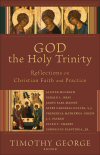
God the Holy Trinity brings together leading scholars from diverse theological perspectives to reflect on various theological and practical aspects of the core Christian doctrine of the Trinity. Throughout, the contributors highlight the Trinitarian shape of spiritual formation. This book will appeal to students, church leaders, and interested laity.
Contributors:
- Alister E. McGrath
- Gerald L. Bray
- James Earl Massey
- Avery Cardinal Dulles
- Frederica Mathewes-Green
- J.I. Packer
- Timothy George
- Ellen T. Charry
- Cornelius Plantinga Jr.
Though the doctrine of the Trinity is basic for all Christian life and reflection, it often remains shrouded in the theologians’ obfuscating mystery. This book, by contrast, with its stellar line-up of contributors, shows why the Trinity is so important for all communities of whatever denomination, documents powerfully the practicality of the doctrine, and does so with crystal clarity. It is an ideal volume for students, church classes, laypeople, and ministers—indeed for anyone who desires deeper understanding of the heart of the Christian faith.
—Mark A. Noll, Francis A McAnaney Professor of History, University of Notre Dame
This book brings into the twenty-first century some of the fruits of the remarkable ecumenical rediscovery of the Trinity in the second half of the twentieth. Grounded in Scripture, and illustrated from the early, the medieval, and the post-Reformation church, Trinitarian doctrine here both illuminates several confessional traditions in Christianity and also offers resources for facing various contemporary issues. Yet warnings are rightly raised against too facile an application of the recently fashionable ’social’ construction of the triunity of God. All in all, a stimulating collection of essays for both positive and critical purposes.
—Geoffrey Wainwright, Cushman Professor of Christian Theology, Duke University
Importantly, [this volume’s essayists] represent diverse traditions. . . . The book is best understood as pastoral counsel since its contributions lie in the domain of practical theology. Accordingly, I recommend it to all audiences with the hope that theorists will duly heed its guidance.
—Trinity Journal
A collection of relatively-accessible essays by scholars from diverse parts of the Christian tradition, God the Holy Trinity presents wide-ranging accents on the Holy Trinity. . . . Pastors might find it interesting as an introduction to the thought of theologians (e.g., Puritan John Owen) and scholars they might not otherwise encounter.
—Trinity Seminary Review
Here . . . is help for articulating the Christian message in our contemporary world. Help, that is, for students and thinkers, as for activists and practitioners.
—Ashland Theological Journal
Timothy George is the founding dean and professor of divinity, history, and doctrine at Beeson Divinity School, Samford University, in Birmingham, Alabama. He is the author or editor of numerous books, including Theology of the Reformers and J.I. Packer and the Evangelical Future. He serves as executive editor for Christianity Today and is on the editorial advisory board of Books & Culture.
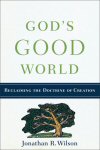
The doctrine of creation has often been neglected in Christian theology. Distinguished evangelical theologian Jonathan Wilson exposes what has been missing in current theological discourse and offers an original, constructive work on this doctrine. The book unites creation and redemption, showing the significance of God’s work of creation for understanding the good news of redemption in Jesus Christ. Wilson develops a trinitarian account of the life of the world and sets forth how to live wisely, hopefully, peaceably, joyfully, and generously in that world. He also shows how a mature doctrine of creation can help the church think practically about contemporary issues, including creation care, sexuality, technology, food and water, and more.
God’s Good World is a very important book. By pointing out how a robust doctrine of creation has been missing—from the church, from education, and from society at large—Jonathan Wilson shows why evangelical engagement with our world is so feeble. He then lays the foundation for a much richer life by showing the necessary connections between redemption and creation. Most important, he shows how we can build on that Trinitarian foundation—in our attitudes toward the body, ‘consuming,’ the internet, business, and much more—all in the light of transformed worship. All Christians should read this book.
—Loren Wilkinson, professor, Regent College
Wilson is right; the modern church has been ‘missing basic research on the doctrine of creation.’ As a result, we modern Christians have very often fallen prey to, or even been cheerleaders for, many of the most self-destructive habits of our age. This book should be mandatory reading for pastors, theological students, and believers who care about the burning moral issues of our day and want to rethink them theologically.
—Brian Brock, reader, King’s College, University of Aberdeen
Jonathan R. Wilson earned his PhD from Duke University and is currently the Pioneer McDonald Professor of Theology at Carey Theological College in Vancouver, British Columbia. He previously taught at Acadia Divinity College and Westmont College, and has served as a pastor. He is the author of numerous books, including Living Faithfully in a Fragmented World, A Primer for Christian Doctrine, and God So Loved the World.
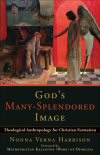
What does it mean to be a human being made in the image of God? In this book Nonna Verna Harrison, a respected specialist in early Eastern Christianity, offers a fresh approach to theological anthropology by revealing the thought of leading early church theologians concerning what it means to be human.
Throughout the ages Christians have believed that the image of God in which we are created is at the core of who we are as humans. Theologians and spiritual writers have found the divine image in many different aspects of human identity. Drawing on the wisdom of the desert mothers and fathers and the heritage of Eastern Christianity, Harrison makes the case that the divine image can be seen in not just one or two aspects of human identity but in all of them. Each chapter explores a different facet of the divine image and likeness and maps out a path that can lead toward wholeness and holiness. Harrison challenges the popularized negative view of human nature as inherently bad by proposing an alternative grounded in early Greek Christian sources.
God’s Many-Splendored Image brings Greek patristic theology to students in a readable fashion and will work well in theology, patristics, ministry, missions, and anthropology courses.
A straightforward account of ancient Greek anthropology and spirituality that shows other, non-Augustinian methods for understanding the human condition before God. This side of patristic theological development deserves to be heard.
—D.H. Williams, professor of religion in patristics and historical theology, Baylor University
Clarity, simplicity, beauty, and depth—these are the gifts offered to the reader in this distillation of all that the Christian tradition has signified by claiming that humanity is created in the image of God and may grow into God-likeness. This book is a model of how to appropriate the church fathers for Christians today.
—Frances M. Young, Emeritus Edward Cadbury Professor of Theology, University of Birmingham, England
This book offers a holistic approach to human formation that is lacking in contemporary scholarship.
—Religious Studies Review
Harrison’s book is a joy to read. Her intimate acquaintance with patristic teaching on theological anthropology is evident throughout. This book, as intended, will be a great resource to non-academics who have questions about the uniqueness and purpose of humanity. Moreover, it is hard to imagine that even the most erudite scholar would not discover at least something new (either materially or spiritually) by reading this splendid work.
—Koinonia
This book will help us to become more human, for the image of God is to become more and more obvious in our character and relations. Through Christ, we can become all we were meant to be, for in taking human flesh, Jesus became the perfect manifestation of the image of God. Here, then, is a book that can transform how you think about yourself and how you view others.
—New Life
Nonna Verna Harrison an experienced patristics scholar, is the author of Grace and Human Freedom according to St. Gregory of Nyssa and numerous articles and translations.
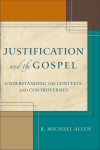
Seeking to move beyond current heated debates on justification, this accessible introduction offers a fresh, alternative approach to a central theological topic. R. Michael Allen locates justification within the wider context of the gospel, allowing for more thoughtful engagement with the Bible, historical theology, and the life of the church. Allen considers some of the liveliest recent debates as well as some overlooked connections within the wider orbit of Christian theology. He provides a historically informed, ecumenically minded defense of orthodox theology, analyzing what must be maintained and what should be reconfigured from the vantage point of systematic theology. The book exemplifies the practice of theological interpretation of Scripture and demonstrates justification’s relevance in ongoing issues of faith and practice.
R. Michael Allen earned his PhD from Wheaton College and is currently the Kennedy Associate Professor of Systematic Theology at Knox Theological Seminary in Fort Lauderdale, Florida. He is ordained in the Evangelical Presbyterian Church and is the author of several books.
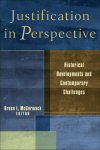
Not since the sixteenth century has the doctrine of justification stood so clearly at the center of theological debate as it has in the last 30 years. This often polemical dialogue has been fueled particularly by discussions on the “New Perspective on Paul.” This important collection draws together diverse voices, committed to an irenic engagement, to explore the historical development and contemporary understandings of the Protestant doctrine of justification.
Justification in Perspective assesses major contributions of the Christian tradition to the subject. This volume constitutes a progress report on the state of the Protestant doctrine of justification in the midst of challenge and change and serves as a way station to greater understanding and resolution.
Contributors:
- Mark Bonnington
- Nick Needham
- David F. Wright
- Carl Trueman
- Karla Wubbenhorst
- Anthony N.S. Lane
- A.T.B. McGowan
- Bruce L. McCormack
- Henri A. Blocher
- Simon Gathercole
- N.T. Wright
That [this volume] is offered as something of an ‘in-house’ conversation among evangelicals of a Reformed flavor is, arguably, part of the collection’s strength. . . . A valuable collection from which the undergraduate or informed historian and systematician will glean much.
—Religious Studies Review
An immensely helpful and sane treatment of the historical, theological, and biblical issues involved in current discussions of Paul and justification. . . . What is needed is a vigorous engagement with the actual issues involved in the discussion that is both penetrating and gracious, embodying the very best of evangelical scholarship. This volume represents a mature work designed to bring clarity to the various debates. . . . This volume of essays is an excellent contribution to the discussions of justification by faith and the ‘new perspective’ on Paul currently up and running in evangelical circles. Its historical and theological discussions provide a rich array of perspectives that have been sorely lacking to this point. It is the hope of many that the increased clarity and sense of historical proportion will be accompanied by a renewed commitment to Christian charity in theological discussion. If this hope goes unrealized, the blame for such a tragedy can in no way be put to the account of McCormack and the contributors to this volume.
—Journal of the Evangelical Theological Society
[This collection] provide[s] a useful window into the various angles from which justification has been assessed and hint[s] at the future prospects for development.
—Themelios
Bruce L. McCormack received his PhD from Princeton Theological Seminary, his MDiv from Nazarene Theological Seminary, his honorary DrTheol from Friedrich Schiller University. He is the Charles Hodge Professor of Systematic Theology at Princeton Theological Seminary. A world-renowned Barth scholar, he is a frequent writer and lecturer on topics of Reformed theology.
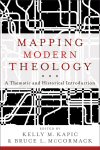
This text offers a fresh approach to modern theology by approaching the field thematically, covering classic topics in Christian theology over the last 200 years. The editors, leading authorities on the history of nineteenth- and twentieth-century theology, have assembled a respected team of international scholars to offer substantive treatment of important doctrines and key debates in modern theology. The volume enables undergraduate and graduate students in modern theology, twentieth-century theology, and contemporary theology courses to trace how key doctrinal questions were discussed, where the main debates lie, and how ideas developed.
Contributors:
- Bruce L. McCormack
- Fred Sanders
- Stephen R. Holmes
- Daniel J. Treier
- Katherine Sonderegger
- Kelly M. Kapic
- Kevin J. Vanhoozer
- John Webster
- Telford Work
- Richard Lints
- Brian Brock
- Richard R. Osmer
- Veli-Matti Kärkkäinen
- Michael Horton
This intriguing volume fills a gap in teaching materials for theological students that has long been noteworthy: it tackles the traditional loci of systematic theology through the lens of modernity’s particular challenges. Not a history of doctrine nor yet a systematic theology in itself, it introduces the reader to the chief problems that Christian systematic theology has had to face in the modern and contemporary periods when seeking to defend, or at times adjust, its classic heritage. Intended primarily for students in the Reformed tradition, this book will prove to be an excellent textbook and focus for debate; the editors are to be congratulated on the quality and insightfulness of the contributions.
—Sarah Coakley, Norris-Hulse Professor of Divinity, University of Cambridge
This collection of 15 essays on key topics will repay careful study. Through examining the different ways in which the central doctrines of the Christian faith have been handled under the pressures of modernity, it provides valuable orientation for students of modern theology. Clear, informed, and insightful, it deserves inclusion on all relevant reading lists.
—David Fergusson, professor of divinity and principal of New College, University of Edinburgh
This is an unusually helpful book. Clearly written, reliable, and illuminating, it traces the development of key Christian doctrines throughout the modern period, and in so doing offers a lucid introduction to modern theology. The best book of its kind. Highly recommended.
—Adam A. Neder, associate professor of theology, Whitworth University
A volume such as this is a welcome guide indeed to the contours of modern theology. Especially valuable is the organization of this book according to the classical doctrinal loci and central concerns of the Christian theological tradition. An impressive lineup of scholars provides a sure guide to the ways each of these concerns has been treated within the context of modernity and demonstrates thereby the necessity of our striving, even if sometimes failing, to tell of the gospel in ways both responsible to the tradition and alert to the realities of contemporary culture.
—Murray Rae, professor of theology, University of Otago
Kelly M. Kapic is a professor of theological studies at Covenant College in Lookout Mountain, Georgia, where he has taught for over a decade. He is the author, editor, or coeditor of several books, including The Devoted Life: An Invitation to the Puritan Classics.
Bruce L. McCormack received his PhD from Princeton Theological Seminary, his MDiv from Nazarene Theological Seminary, his honorary DrTheol from Friedrich Schiller University. He is the Charles Hodge Professor of Systematic Theology at Princeton Theological Seminary. A world-renowned Barth scholar, he is a frequent writer and lecturer on topics of Reformed theology.
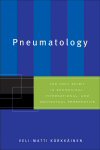
One of the most exciting recent developments in theology has been an unprecedented interest in the person and work of the Holy Spirit. In fact, Veli-Matti Kärkkäinen describes this phenomenon as a “pneumatological renaissance.” But such discussion should be informed, he contends, by two overarching principles. First, we must acknowledge the variety of approaches to the experience of the Holy Spirit ecumenically: “No church can claim a monopoly on the Spirit, and no tradition is specifically ‘spirited.’” Second, talk about the Spirit must always be contextual and therefore culture-specific: “The Spirit of God . . . indwells believers and creation in specific and tangible ways.”
Working from this perspective, the book introduces readers to pneumatology, the theology and spirituality of the Holy Spirit, in current international theology. As such, the work offers a biblical, historical, and theological assessment of the Third Person of the Trinity. However, unlike most textbooks on pneumatology, Kärkkäinen takes a fresh, innovative approach. Rather than focusing on any single topic, his aim is to chart the various territories of contemporary writings and reflections on pneumatology.
Consequently, the volume examines various theological and denominational understandings of the Spirit (all major Christian traditions are reviewed), assesses key contemporary theologians of the Spirit (e.g., Pannenberg, Moltmann, and Pinnock), and inquires into several contextual approaches (e.g., liberation, feminist, and green). These distinctives and the emphasis on the contemporary global scene make this a unique volume.
An up-to-date survey of the most noteworthy and theologically pregnant orientations to the Spirit in the worldwide ecumenical and intercultural scene, this work will guide readers in discerning the Holy Spirit’s activity at the beginning of the third millennium.
Veli-Matti Kärkkäinen’s Pneumatology is the most comprehensive yet succinct introductory text to the doctrine of the Holy Spirit on the market today. It covers a tremendous amount of ground and does not miss much of importance in reflection on the Holy Spirit in the last two generations. Readers will come away with their appetite whetted for more in-depth study on this topic. Even seasoned theologians would be well-advised to look at Kärkkäinen’s text to ensure that they do not overlook important resources for reflection and engagement. Here is evangelical theologizing on pneumatology at its best: ecumenical, engaged, aware, and alert.
—Amos Yong, J. Rodman Williams Professor of Theology, Regent University
Kärkkäinen brings to the study of pneumatology an unusual breadth, namely a deep knowledge of the classical Pentecostal tradition at the international level and an understanding of Lutheran systematics and Eastern Orthodoxy pneumatology, as well as a more than passing acquaintance with the Roman Catholic tradition. Few young scholars can boast as much. To his scholarly concerns he adds his experience as a missionary in the Far East. His review of theologians working in the field of pneumatology is especially helpful.
—Kilian McDonnell, founder and president, Collegeville Institute for Ecumenical and Cultural Research
Veli-Matti Kärkkäinen’s book provides an excellent introduction to the study of contemporary pneumatology. It offers the reader a number of entry points to the subject by looking at pneumatology from various perspectives. Kärkkäinen summarizes an impressive array of positions and viewpoints accurately and succinctly without losing sight of the main issues, themes, and theologians. Pentecostals and charismatics will find it particularly helpful, as Kärkkäinen keeps many of their distinctive concerns in view. I highly recommend it as an introductory text.
—Simon Chan, lecturer, Trinity Theological College
Kärkkäinen’s book will help scholars and students alike appreciate recent efforts at reflection on the Spirit in the light of their ecumenical and historical past. Kärkkäinen successfully takes readers through the maze of contemporary pneumatology. He is attentive to the complexity of thought involved in pneumatologies past and present but utilizes a lucid style that will make his work valuable for the classroom. This up-to-date treatment makes an important addition to the histories of pneumatology written in the past.
—Frank D. Macchia, professor of theology, Vanguard University
Veli-Matti Kärkkäinen received his DTheol from the University of Helsinki. He is a professor of systematic theology at Fuller Theological Seminary and also holds teaching posts at the University of Helsinki and Iso Kirja College in Finland. He is the author of Pneumatology: The Holy Spirit in Ecumenical, International, and Contextual Perspective and Christology: A Global Introduction.
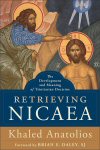
Khaled Anatolios, a noted expert on the development of Nicene theology, offers a historically informed theological study of the development of the doctrine of the Trinity, showing its relevance to Christian life and thought today. According to Anatolios, the development of Trinitarian doctrine involved a global interpretation of Christian faith as a whole. Consequently, the meaning of Trinitarian doctrine is to be found in a reappropriation of the process of this development, such that the entirety of Christian existence is interpreted in a Trinitarian manner. The book provides essential resources for this reappropriation by identifying the network of theological issues that comprise the “systematic scope” of Nicene theology, focusing especially on the Trinitarian perspectives of three major theologians: Athanasius, Gregory of Nyssa, and Augustine.
Khaled Anatolios’ new book is a welcome addition to the flood of revisionary scholarship on patristic Trinitarian theology in the last 20 years. Anatolios’ treatment helps us to see the perennial importance of the key figures of the fourth and fifth centuries for all of our thought on this central mystery of the Christian faith. The clarity of his exposition and his constant desire to draw out the consequences of historical exposition mean that this book will find a treasured place on the bookshelves of theologians and theology students across the board.
—Lewis Ayres, Bede Professor of Catholic Theology, Durham University
With this impressive book, Khaled Anatolios takes his place alongside luminaries like R.P.C. Hanson and Lewis Ayres as one of the most distinguished interpreters of Nicaea and its legacy. Especially important is his sympathetic interpretation of Athanasius. For anyone who wants to understand Nicene Christianity and its relevance for today, Anatolios is quite simply indispensable.
—George Hunsinger, Hazel Thompson McCord Professor of Systematic Theology, Princeton Theological Seminary
Khaled Anatolios puts the ‘theology’ back into ‘historical theology,’ explaining how the doctrine of the Trinity emerged out of an effort to account for the full sweep of Christian scripture and worship. The result is a brilliant book of spiritual as well as scholarly significance.
—R.R. Reno, professor of theological ethics, Creighton University
Undergraduates and seminary students often have difficulty grasping the arguments that led to the formation of the Christian doctrine of Trinity. This introduction . . . will make the job of teaching these crucial debates much easier. Dealing with sources of the Eastern and Western traditions, the book overcomes traditional divisions between history of exegesis, historical theology, and systematic theology. . . . Advanced undergraduates might well find the book a helpful companion to their reading of primary sources. . . . An important overall narrative of critical debates in Christian theology. Teachers and students of these debates and their connections to classical and contemporary Christian practice will find it both clarifying and edifying. . . . Recommended. Upper-level undergraduates through researchers/faculty.
—Choice
Khaled Anatolios is a professor of historical theology in the Boston College School of Theology and Ministry. He is the author of Athanasius: The Coherence of His Thought and the Athanasius volume in Routledge’s Early Church Fathers series. Anatolios was named a Henry Luce III Fellow in Theology for 2011–2012. He is also on the steering committee of the Boston Colloquy in Historical Theology and on the board of directors of the Pappas Patristic Institute at Holy Cross Greek Orthodox School of Theology.
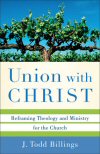
Accomplished theologian J. Todd Billings recovers the biblical theme of union with Christ for today’s church, making a fresh contribution to the theological discussion with important applications for theology and ministry. Drawing on Scripture and the writings of figures such as Augustine, Calvin, Bavinck, and Barth, Billings shows how a theology of union with Christ can change the way believers approach worship, justice, mission, and the Christian life. He illuminates how union with Christ can change the theological conversation about thorny topics such as total depravity and the mystery of God. Billings also provides a critique and alternative to the widely accepted paradigm of incarnational ministry and explores a gospel-centered approach to social justice. Throughout, he offers a unique and lively exploration of what is so amazing about being united to the living Christ.
An important book on an important topic. Billings brings his expertise regarding Calvin to bear not only on misconceptions about the great Reformer, but also on contemporary misconceptions of Christ and Christian ministry. He offers an accessible and rewarding study, demonstrating that the centrality of union with Christ can solve many theological problems in a way that has direct practical significance for today.
—George Hunsinger, Hazel Thompson McCord Professor of Systematic Theology, Princeton Theological Seminary
Drawing upon the likes of Augustine, Calvin, Bavinck, and others, Todd Billings ably demonstrates why the biblical truth of union and communion with God has had such historical and theological significance. Thankfully, he doesn’t leave us out of the story. Along the way he highlights why union with Christ continues to matter for our understanding of the Christian life, making insightful connections between adoption and participation, incomprehensibility and accommodation, justice and Eucharist, grace and action. Let Billings take you into a deeper appreciation of what it means to be united to Christ—you won’t regret it.
—Kelly M. Kapic, professor of theological studies, Covenant College
J. Todd Billings is an associate professor of Reformed theology at Western Theological Seminary in Holland, Michigan, and an ordained minister in the Reformed Church in America. He is the author of numerous articles and two award-winning books: Calvin, Participation, and the Gift: The Activity of Believers in Union with Christ and The Word of God for the People of God.
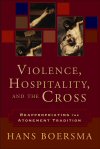
The cross is central to any understanding of Christian theology. But what is the primary significance of the cross: God’s victory over death and hell? The moral example of a righteous sufferer? God’s Son taking the punishment for the world’s sin? Or is it possible that in our postmodern setting these traditional views of the atonement are irrelevant and outmoded? In this important study, Hans Boersma proposes an understanding of the atonement that is sensitive to both the Christian tradition and to postmodern critiques of that tradition.
Throughout his work, Boersma takes seriously the critics of traditional atonement theology. He also acknowledges a certain paradoxical tension between violence and hospitality that will remain a mystery. Nevertheless, he offers a substantial response in the form of an alternative account of violence that also reenvisions the atonement as divine hospitality.
In the first section, Boersma considers the basic theological issues as well as the postmodern critique. He also addresses the question of election and proposes a biblical vision of “preferential hospitality.” In the second section, Boersma embraces the three historical views of the atonement and suggests that the “recapitulation” theory of Irenaeus is most compatible with the metaphor of divine hospitality. The third section looks at the church as the community of God’s hospitality, both in its role as the continuing presence of Christ in the world and as a proponent of public justice.
This is an important contribution to contemporary theology. In light of current criticisms, Boersma offers a new model for looking at the atonement that draws on the rich resources of the Christian tradition in its portrayal of God’s hospitality in Jesus Christ.
This is a bold book. It takes courage in today’s academic culture to argue that divine violence is an unavoidable part of bringing the sinful world into an eschatological state of pure hospitality. Those who tend instinctively to reject any notion of violence as unworthy of God better take Boersma’s arguments seriously.
—Miroslav Volf, Henry B. Wright Professor of Systematic Theology, Yale University Divinity School
Violence, Hospitality, and the Cross is an important contribution to the ongoing task of articulating orthodox Christian theology in light of contemporary thought. Boersma is a creative, constructive theologian who is not afraid to tackle some of the toughest criticisms leveled against the Christian tradition. His courage in the face of postmodern criticisms is matched by his courage to take the tradition seriously. This book is learned and erudite, engaging an impressive range of biblical, theological, and philosophical sources.
—James K. A. Smith, professor of philosophy, Calvin College
Boersma combines postmodern philosophy and ancient theology to address how God’s hospitality at the cross undermines violence and supports human hospitality. Violence, Hospitality, and the Cross is a model of how scholarship and praxis are united in the work of the kingdom.
—Robert Webber, William R. and Geraldyn B. Myers Professor of Ministry, Northern Seminary
Christ prayed that all may be one, and he even died to bring about that atonement. Yet Christians now find themselves, paradoxically, divided up according to models of Christ’s atonement. This is a noble and beautiful book—a labor of mind and heart to synthesize and unite all that is in the science of our salvation as it has come down to us in Christian tradition and as it is emerging in theological currents today.
—Scott W. Hahn, professor of Scripture and theology, Franciscan University of Steubenville
A scholarly review and analysis of differing historical and contemporary understandings of God’s work of reconciliation in Jesus Christ, particularly with regard to hospitality and violence. . . . Well structured and readable. . . . Recommended for scholarly theological collections.
—Library Journal
Hans Boersma is the J.I. Packer Professor of Theology at Regent College in Vancouver, British Columbia. He is the author or editor of several books, including A Hot Pepper Corn: Richard Baxter’s Doctrine of Justification in Its Seventeenth-Century Context of Controversy.